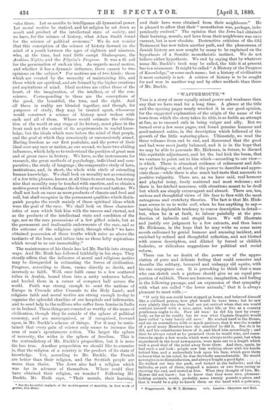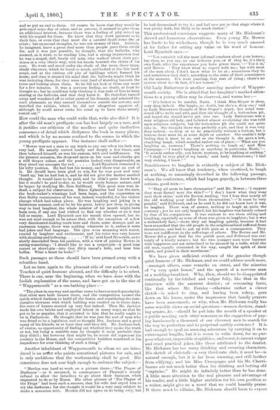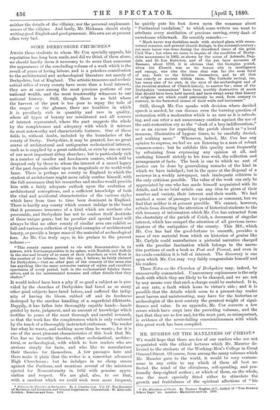" WAPPERMOUTH."
Tins is a story of more equally mixed power and weakness than any that we have read for a long time. A glance at the title and the opening pages nearly wrecked it in our good opinion, for the suggested explanation of the origin of the name of the town from which the story takes its title, is so feeble an attempt at fun, as to succeed only in being vulgar and silly. But we turned over a few more pages, and found genuine humour and good-natured satire, in the description which followed of the growth of the little watering-place. Ultimately, we read the three volumes from end to end, and discovered that the good and bad were most justly balanced, and it is in the hope-that we may be able to persuade Mr. Hickman, in future, to discard this equitable adjustment, and let the bad kick the beam, that we venture to point out to him which—according to our view— is which. There is abundant evidence of refinement and deli- cacy of feeling—or, at least, of the power to describe and appre- ciate them—while there is also much bad-taste that amounts to positive vulgarity. There are, as we have said, real humour and playful irony, freely scattered and most welcome ; and there is far-fetched nonsense, with situations meant to be droll but which are simply extravagant and absurd. There are, too, serious and thoughtful views of life face to face with the most outrageous and crotchety theories. The fact is that Mr. Hick- man seems to us to write well, when he has anything to say— barring his deplorable tendency to coarse description in detail— but, when he is at fault, to labour painfully at the pro- duction of imbecile and stupid farce. We will illustrate and justify our judgment by a few extracts, and then leave Mr. Hickman, in the hope that he may write us some more novels enlivened by genial humour and amusing incident, and enriched by refined and thoughtful reflection, and not blotted with coarse description, and diluted by forced or childish fooleries, or ridiculous suggestions for political and social reform.
There can be no doubt of the power or of the appre- ciation of pure and delicate feeling that could conceive and describe the solitary, bereaved and unhappy old squire, with his one scapegrace son. It is provoking to think that a man who can sketch such a picture should give us an equal pro- portion of rubbish. There are humour, imagination, and feeling in the following passage, and an expression of that sympathy with what are called "the lower animals," that it is always pleasant to meet with :—
"If only his son could have stopped at home, and behaved himself like a civilised person, how glad would be have been ; but he saw very plainly that the time had not yet arrived when that son would content himself with a nice, quiet, sober life, or live as a country gentleman ought to do. Poor old man ! be did his best by every- body, as far as he could ; but he was what Captain Goggler would have called a very lonely old cove.' He worked hard in the House, and sat on committees with so much patience, that it was the wonder of a good many Members bow the mischief he did it. But do it he did, and his constituents knew of it, and liked him accordingly ; and then he always voted as he promised them he would vote, and some- times he spoke a few words, which were always to the point, but when reproduced in the local newspapers, were spun out to a length which took a good deal of the point away from them. And then, again, he had such a sad look : people saw him walking about with his hands behind him, and a melancholy look upon his face, which gave them to know that in his mind, he was decidedly uncomfortable. He would never give in to dissatisfaction, and always fought a good fight He walked out into the park, and looked at the bullocks; and the bullocks, or part of them, stopped a minute or two from eating or chewing the cud, and stared at him. What they thought of him, Mr. Mowse did not know ; but he knew that they were nice, pleasant. looking animals, worth, probably, some twenty pounds a-piece, and that it would be a pity to knock them on the head with a pole-axe, * Trappermouth. By W. T. Hickman. vols. London Chapman and Hall. and so put an end to them. Of course he brew that they would be pole-axed some day or other, and at present, it seemed to give them an additional interest, because there was a feeling of pity mixed up with his regard for them. He knew that they were ignorant as to their fate, or even that they must die a natural death some day or other ; but on second thoughts, he was not so sure of that. Animals, he imagined, knew a great deal more than people gave them credit for, and it was just possible, he thought, that the bullocks, who seemed, as it were, to be reading him, had a strong impression that he was a stupid, dull, lonely old man, who walked about their pre- mises in a very idiotic way, with his hands beneath the skirts of his coat. He went and stood under the shade of the trees, those large, shady elm-trees, which he loved so much, and looked at the fair land- scape, and at the curious old pile of buildings which formed his house, and then it crossed his mind that the bullocks might think he was imitating them, for they were very fond of standing beneath the trees and looking about them. So he did not look at them any more for a few minutes. It was a nervous feeling, no doubt, at least he thought so ; but he could not help thinking it was rude of him to keep staring at the bullocks, and that they knew it. He therefore turned away and wandered off to other parts of his domain, and admired the cock pheasants as they sunned themselves outside the coverts, and watched the rabbits, which he did not altogether approve of, although he could never make his mind up to have them utterly rooted out."
How could the man who could write that, write also this ? It is after the old man's profligate son has lost largely on a race, and it justifies our criticism of the needless and quite ineffective coarsenes s of detail which disfigures the book in many places, and which is by no means confined to the scenes in which the young profligate appears. One instance shall suffice :-
"Mowse was not a man to say much to any one when his luck was very bad. He usually cursed loudly and deeply a few times, and then behaved himself, as was his custom, with cool indifference. On the present occasion, the deep-red spots on his nose and cheeks got a still deeper colour, and the pustules looked very disagreeable, as
they stood out amongst the red Lord Hyacinth remained in his lofty position. He had lost his money, and there was an end of it. He should have been glad to win, for he was poor and very 'hard up,' but he had lost it, and he did not give the matter another thought. It would have to be paid, and he didn't quite know how ; but it needn't be paid to-day, so he would study human nature, and he began by studying Mr. Sam Baldhead. This good man was, in- deed, a subject for observation. Since Eglantine had lost the race, the book-maker's winnings had been large, and tho expression on that flabby countenance of his was, indeed, wonderful, for the violent change which had taken place. He was laughing and joking in a boisterous manner, and as he let his great, heavy jaw drop, in giving way to loud laughter, the whole interior of his mouth might have been seen, if any one had wished to find out whether or no it was full or empty. Lord Hyacinth saw his month thus opened, but he was not near enough to be aware that, with the exception of a few very discoloured-looking teeth here and there, some stumps, and an enormous tongue, there was nothing whatever in it, unless it were bad jokes and foul language. The eyes were steaming with water, caused by laughter and excitement, and his voice was very hoarse
with shouting and holloaing said Lord Hyacinth, as he slowly descended from his position, with a view of joining Mowse in eating something; 'I should like to run a carpet-pin—a good long carpet or shawl-pin—into that dirty rascal's hide, and hear him hellos. What a beast he looks !' "
Such passages as these should have been pruned away with a relentless hand.
Let us turn again to the pleasant side of our author's work. Touches of quiet humour abound, and the difficulty is to select. There is one, near the beginning, when we have done with the foolish explanation of the name, and have got on to the rise of " Wappermouth " as a sea-bathing place :—
"The place in one way and another came to have so much popularity, that other men built houses there, and the competition caused the quick-witted Jackson to build all the faster, and considering the com- parative slowness with which building was carried on in those days, the rows of houses started up very fast indeed. Then Mr. Jackson made his own bricks and employed labour in many ways, so that he got to be so popular, that it occurred to him that he really ought to be in Parliament. He thought that he was just the sort of man who was fitted to be a legislator, and so thought Mrs. Jackson and a good many of his friends, or at least they said they did. Mr. Jackson had, of course, no opportunity of finding out whether they spoke the truth or not, but being a sensible man he thought it most probable that they didn't ; but however that might be, be never did represent his country in the House, and the competitive builders wondered at his impudence for ever thinking of such a thing."
Another inhabitant of Wappermouth to whom we are intro- duced is an arttst who paints sensational pictures for sale, and is only ambitious that the workmanship shall be good. His conscience does not soar high enough to embrace the subject:—
" Merdon was hard at work on a picture there—' The Plague of Darkness '—as it occurred, in consequence of Pharaoh's steady refusal to allow the Israelites to go about their business, when requested to do so by Moses. His other picture of The Plague of the Frogs' had been such a success, that his wife had urged him to try the darkness ; for she thought it would be a very easy subject to make a sensation with. Merdon did not agree to its being easy, but
he had determined to try it ; and had now got to that stage where it was pretty dark, but likely to be much darker."
This professional conscience suggests many of Mr. Hickman's shrewd and humorous observations. Even young Mr. Mowse has limits to his wickedness, though be is very much amused at his father for setting any value on his word of honour. Lord Hyacinth says :—
" You certainly tell the most infernal crackers about your horses ; but then, as you say, no one believes you, or if they do, it's their own fault, after the experience you have given them.'—' Yes it is,' said Mowse. They know what to expect with me ; but with most of the men about, I don't know what to be at ; sometimes they lie and sometimes they don't, according to the state of their consciences at the moment. It's most puzzling, that sort of thing ; there's no system about it,—in fact, it's not honest.'"
Old Lady Buttervere is another amusing member of \\mapper- mouth society. She is afraid that her daughter's marked atten- tions to a young officer may be observed, and warns her :—
" It's better to be careful, Maria. I think Miss Slopor is deep,. very deep indeed. She laughs, no doubt, but she's a deep one ;' and as Lady Buttervere thought of Miss Sloper's depth, her mind wan- dered off to wells and pits, and then she thought of a bottomless pit,. and hoped she should never get into one. Ludy Buttervere Was a very religious old lady, and believed almost everything she was told upon religious subjects, but the bottomless pit she could not quite take in. She thought there was probably a pit, and that it was very deep indeed,—so deep as to be practically without a bottom, but a bottom there must be, at some depth or another. She couldn't help feeling that it must be so, and as she thought it, she gave a low, chuckling laugh, which sounded rather out of place.—' What are you laughing at, mamma ? There's nothing to laugh at,' said Miss Crosspage.—' I wasn't laughing at anything in particuhu., Maria'— 'It sounds rather silly, you know, mamma, to be laughing at nothing.'
I shall be very glad of my lunch,' said Lady Buttervere ; I feel very sinking, I know.'"
Sensitiveness to laughter is evidently a subject of Mr. Hick- man's. We all know that tendency, when overtired, to laugh at nothing, so amusingly described in the following passage, when the conference, which had begun gravely, is between three serious, good men :— " They all seem to have rheumatics!' said Mr. Mowse; I suppose they wear flannel next the skin ?'—' I don't know what they wear next their skins,' said the Rector, smiling, but I fear that nearly all the old working poor suffer from rheumatism.'—' It must be very painful,' said Fellwood, and as he said it, he did not know how it was, he laughed. There was, of course, nothing to laugh at, quite the contrary ; yet he not only laughed, but his laughter was faintly echoed by that of his companions. It was curious to see them sitting and laughing, especially as none of them was given to laughter ; but it was a melancholy fact,—there they sat laughing quietly, because it had been remarked that the old people in the neighbourhood suffered front rheumatism, and had to put up with pain as a consequence. They were not indifferent to the sufferings of others. The Rector and Mr. Mowse did a good deal for the parish poor, and Fellwood was cer- tainly of a kindly nature ; but the two younger men were buoyant with happiness and not unincliued to be amused by a trifle, while the old man, equally contented in his way, caught the spirit of their mirth, and joined in their merriment."
We have given sufficient evidence of the genuine though quiet humour of Mr. Hickman, and we could adduce much more, —amongst others, some remarks on ennui, and the miseries- of "a very quiet house," and the speech of a nervous man at a wedding-breakfast. Why, then, should we be disappointed continually by far-fetched and vulgar- folly, like that in the interview with the amateur dentist; or screaming farce, like that where Mr. Fernley—otherwise rather a clever. sketch—is asked to sing, and having been asleep, goes- down on his knees, under the impression that family prayers have been announced ; or why, when Mr. IIickman really has some sensible views on social questions—women-doctors, stand- ing armies, &c.—should he put into the mouth of a speaker at a public meeting such utter nonsense as the suggestion of pay-
ing handsomely a thousand of our cleverest men to search for the way to perfection and to perpetual earthly existence ? It is bad enough to spoil an amusing adventure by carrying it on to extravagant lengths, but it is worse to write down, for no pur- pose whatever, im possible stupidities; and worst, to invent vulgar and cruel practical jokes, like those attributed to the dentist. Mr. Hickman has too many drinking and swearing characters. His sketch of club-talk—a very third-rate club, it must be—is- natural enough, but it is far from amusing, and still farther from edifying ; and his Miss Crosspages and his Mr. Cherri- baums are not much better than his drinking and betting old "captains." He might do infinitely better than he has done.. A little more attention to the real pleasure and advantage of his reader, and a little higher ambition for his own position as a writer, might give us a novel that we could heartily praise. If there must be villains, Mr. Hickman should learn to expose neither the details of the villainy, nor the personal unpleasant- flosses of the villains. And lastly, Mr. Hickman should study writing good English and good grammar. His own are at present often very bad.




































 Previous page
Previous page